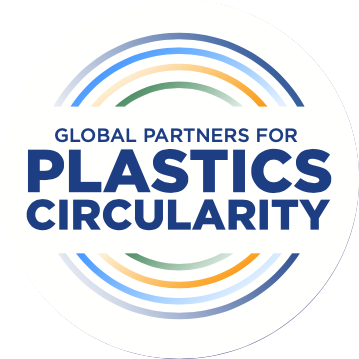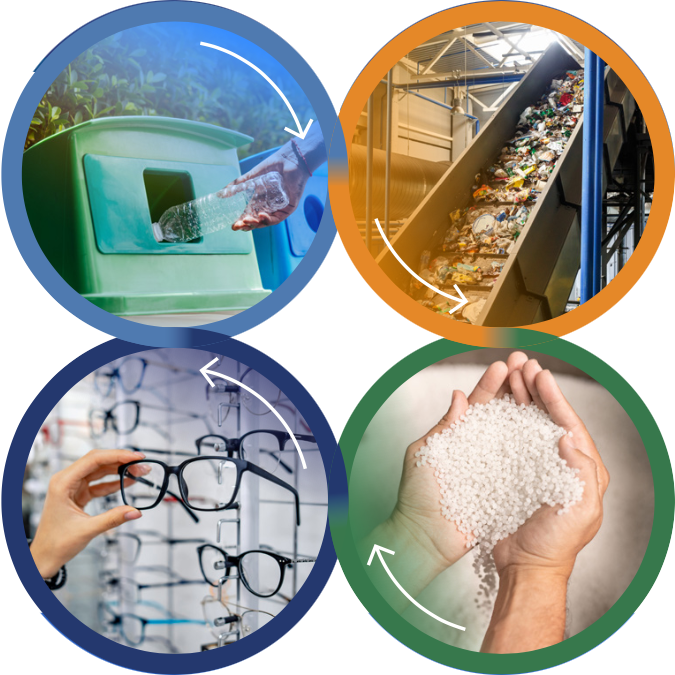
Creating a Circular Economy for Plastics Helps Achieve Sustainable Development Goals
Creating a circular economy for plastics — in which plastics are sustainably produced, designed, used, reused and recycled — will help achieve important sustainable development goals (SDGs). Plastics (and other materials) should be kept in use for as long as feasible and then recycled to prevent them from becoming waste. A global agreement can help develop robust plastics collection/recycling infrastructure and supply chains that support local/regional solutions to ending plastic waste.
Learn how a global agreement can contribute to a circular economy for plastics.

Creating a Circular Economy
By applying circular economy principles in which plastics are recycled instead of discarded, we can return plastics back to the manufacturing stream to make new products, building value from plastic waste as a feedstock and opportunities for additional growth. The circular economy expands the potential of plastics beyond “make-use-dispose” by viewing and treating plastics as a feedstock for multiple new products.


Circular Economy Helps Achieve SDGs
Keeping plastics in use for as long as feasible and recycling plastic waste will help achieve multiple SDGs, including goals on climate change, responsible consumption/production and life below water.
While plastics are exceedingly efficient materials and typically help reduce greenhouse gas emissions compared to common alternatives, reusing/recycling plastics further drives down greenhouse gas emissions. Studies show that both mechanical and chemical recycling technologies reduce greehouse gas emissions compared to typical production. Recycling reduces the extraction, transport, and production of key raw materials needed to make plastics, as well as the associated emissions. These reductions in emissions contribute to climate changes SDGs.
Learn more about how plastics contribute to Sustainable Development Goals.

Create Waste Infrastructure: First Step for Circularity
Many communities throughout the world lack even basic systems to collect waste. Used materials often are discarded onto land and into waterways or our ocean, where they can circle the globe. this unmanaged waste can lead to serious environmental and economic damage.
A global agreement should focus on supporting the creation of local and regional systems to collect plastic (and other) waste and utilize its inherent value through recycling. Communities will need political support, technical expertise and funding to develop the most appropriate solutions based on the local/regional situation.


Develop Local/Regional Supply Chains and Markets
A global agreement can enable communities to develop new enterprises utilizing materials that today are viewed as waste. Given the appropriate expertise and resources communities can develop solutions to plastic waste that create new products, markets, and jobs, leading to local/regional supply chains that consume used plastics., Communities hsoud have the flexibility to create their own solutions that fit the needs and economies of their area.
Partnering with the private sector will be key to successfully creating these supply chains. The plastics value chain stands ready to work with governments to facilitate cross-value chain collaborations, elevating the priority of waste management minimizing inadequate disposal, enhancing solid waste infrastructure, improving livelihoods of waste collectors, and enabling sustainable growth in markets for recycled materials.
Utilize New Recycling Technologies
Enhancing the deployment of new recycling technologies will increase the value of recycled materials, encouraging sustainable supply chain growth.
For example, chemical recycling technologies can significantly expand the amounts and types of plastics that can be recycled, converting today’s non-recycled plastics into tomorrow’s feedstocks and new products. chemical recycling technologies are complementary to traditional mechanical recycling and can be important part of communities’ integrated solid waste management. These technologies can be tailored to specific local/regional/national needs, such as incorporating the informal recycling sector.
Countries should ensure permitting frameworks and regulations for recycling technologies that enable these advanced 21st century innovations.


Advance Design for Circularity
A global agreement can help facilitatie collaboration between government and the private sector by developing guidance on “Sustainability by Design” approaches. The plastics value chain can further contribute by applying sustainability by design approaches for developing innovations in product delivery and packaging formats to reduce waste and increase recyclability and recoverability.
Championing a global agreement for a sustainable, circular economy.
